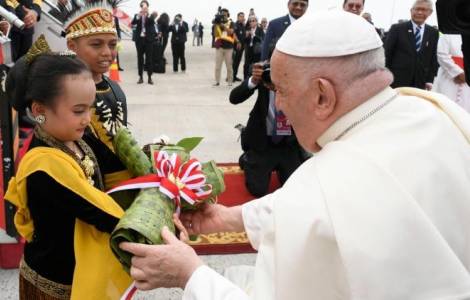
VaticanMedia
by Gianni Valente
Rome (Agenzia Fides) - With the arrival in Jakarta of the flight that took off from Rome, Pope Francis' 45th international apostolic journey has begun. The Bishop of Rome, at almost 88 years of age, is making his longest journey to visit the Churches and peoples of Indonesia, Papua New Guinea, East Timor and Singapore. He is moving along routes that take him far from the places of war and power struggles that the attention of the global media system focuses on.
"Reality is better seen from the periphery than from the center," Pope Francis once explained in an interview with a parish newspaper from Villa la Càrcova, a slum in the Greater Buenos Aires area. "Normally," Bergoglio added on that occasion, "we move in spaces that we control in one way or another. This is the center. As we leave the center and move away from it, we discover new things". A suggestion that can also be found in the studies of the Argentine philosopher Amelia Podetti (1928-1979), whom Pope Bergoglio met in his youth. She too used to repeat in her lectures that Europe was "seen" differently after Ferdinand Magellan's circumnavigation of the world. From Madrid, the world was seen differently than from Tierra del Fuego: the view was wider and one could see things that remained hidden to those who looked at everything from the "center".
Pope Francis' trip to Asia and Oceania can also help to grasp important details for the path of the Church and current world events. Details that are often not captured or obscured in the prevailing media representation of the present.
In many parts of Asia, due to the prevailing conditions, Christian communities are experiencing a dynamic that in some respects comes close to that of the beginnings of Christianity. A perspective that must also be considered at this historical moment in the countries of old "Christianity", where growing majorities, especially among young people, no longer have any real interest in or living, existential contact with Christianity.
Most Christian communities in Asia live in "plural" contexts, culturally marked by great religious traditions such as Buddhism, Islam and Hinduism. In particular, the example of Indonesia, with its fundamentally harmonious coexistence with the Muslim majority, shows that, in their flourishing among peoples, Christian communities are finding ways not to become hostages to the logic of the "clash of civilizations".
In East Timor, the ecclesial communities have accompanied the troubled path of the history of this young nation. They have immersed themselves in this historical process. Throughout this period of trial, participation in ecclesial and sacramental life has grown, and there is now an urgent need to heal wounds and also to contribute to reconciliation with Indonesia. Believers profess their faith in the midst of the country's history. They shared the concerns and hopes of all.
In Papua New Guinea, as in so many countries in Asia and Oceania, the local Churches keep the grateful memory of many missionaries and martyrs. The local Catholic communities, encouraged also by the Magisterium of Pope Francis, are following the path of adaptation to their respective contexts and are gradually breaking down the prejudice that presents the relationship between Christianity and Asia as "cultural colonization".
The missionaries who will meet Pope Francis testify that mission, leaving one's own sphere to proclaim the love and salvation of Christ to all, are not outdated customs, but continue to be understood as a gift of grace that keeps the Church alive.
Christianity began in Asia and is not "returning" to Asia as a religion of the West. The communities of the baptized that the Pope encounters on his journey and who are rooted in this context are therefore not "foreign bodies".
This is particularly important in the current historical situation, in which everything is interpreted as opposition and "struggle" between the so-called West and everything that is not the West.
(Agenzia Fides, 3/9/2024)